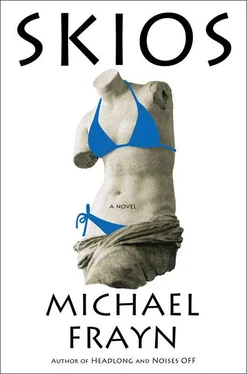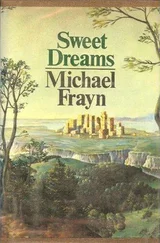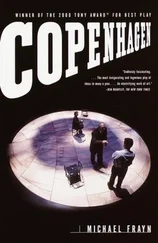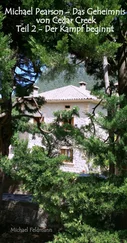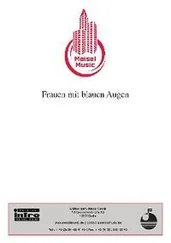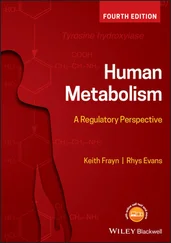“I assume that this is a genuine mistake on your part,” he said, “and not some attempt to demand money, which I may say has happened to me before.”
He hesitated, and then said in a different voice, “Or are you something to do with the foundation in some kind of way?”
The foundation? She gazed at him blankly.
“The Fred Toppler Foundation.”
Some kind of clinic, perhaps. Of course. He wasn’t a convict. He was an inmate of a clinic, out on day release.
“You’re not also a guest?” he said. “Of the foundation?”
She risked shaking her head.
“Because, you see, this is the foundation’s guest quarters,” he said. “It is reserved for guests of the foundation. I am endeavoring to find someone in authority who will be able to help you to get wherever you are supposed to be. Unfortunately I set out in the wrong direction. Which is why I have come back. I apparently need to go in the opposite direction.”
He turned towards the corner that led to the back of the villa. But by this time Georgie had had time to recover a little from her alarm. He was a sick man who needed help and understanding. Maybe he’d forgotten to take his medication. Or was so full of it that he didn’t know what he was doing. He certainly seemed to be deeply confused. Exposure to the midday sun had probably not helped matters.
“Hat!” she called after him. “Sunblock!”
She waved her own hat and tube of sunblock at him, but he vanished round the corner. She waited, with the towel clutched around her. After a while her alarm began to fade. The sun, however, did not. She took off the towel, removed the rest of her bikini, stretched herself out on the lounger, and applied the sunblock to herself.
* * *
Midmorning coffee was being served under the trees shading Alcmaeon’s Walk. Everyone was reclining on the basket chairs around Dr. Wilfred, but in ways suggesting that their ease was tempered by deference.
Dr. Wilfred himself, however, was entirely at his ease. Among all the confusion of faces and names around him, the identity he was now most certain of was his own. His brief panic at breakfast, when for a moment he had slipped back into being Oliver Fox again, was long since over. He was Dr. Norman Wilfred, and the long years of being Oliver Fox had receded into the past like the brief spells when he had been Ophelia and Father Christmas. In some ways he was more Dr. Norman Wilfred than he had ever been Oliver Fox. He had had many negative feelings about his old persona; he had none at all about his new one. He enjoyed his distinction and importance. He was proud of his achievements, whatever they were. He felt as if he had moved into a spacious new house, where there was room for extra furniture and new pictures on the walls, where there were roomy attics and cellars in which the unwanted lumber of the past could be dumped. It was what estate agents called an imposing residence, and living in it was a perpetual adventure, a challenge that brought out the best in him. Ideas and opinions seemed to like it, too. They found the occasion to drop in on him in a way they rarely had in his old house.
Ideas about climate change, for instance; views about stem-cell research; thoughts about the genetic modification of crops. To none of these subjects had he ever in his old life given a moment’s consideration. The faces around him had no sooner to mention them, though, and accord him a respectful silence for his reply, than a reply began to utter itself — and often one of an originality and oracular profundity that plainly took them by surprise. Himself, too. Dr. Norman Wilfred, discovered Dr. Norman Wilfred, believed that climate change would encourage the study of foreign languages. Stem cells were like the little silver balls that were used to decorate children’s birthday cakes. Genetic modification reminded him of the attempts made by his eccentric Auntie Jane, of whom he had never heard before, to train her four cats to appreciate poetry.
For a moment, as people heard these simple but mysterious utterances, they seemed to catch a glimpse of a meaning, like a touch of gold appearing through a passing window high in the stacked and complex cumulus of the world. The meaning vanished again as swiftly as the shifting gold, but was as transcendent while it lasted.
The conversation moved on to the cosmological and the theological. What had preceded the Big Bang? Did he see a role for God in cosmology? Had God been constrained by the laws of physics, or had he made the laws of physics up as he went along? Were there other universes?
And here Dr. Wilfred, since he seemed to be some kind of scientist, became a little more technical. Everything in his personal experience, he said, suggested that it was possible to make something from nothing, and to do it simply by deciding that it was so. What was there before the Big Bang? Nothing. God had simply said, “Bang!” and bang it went. Bang — yes, and there among everything else were the laws of physics. Oh, and forty more universes. A million more. An infinity of them.
So now we came to the age-old chestnut: if it had taken a God to bring all this into being, how had God himself come into being? — Simple, in Dr. Norman Wilfred’s view. He had done it in exactly the same way. With a bang. An even bigger bang, probably, though this was difficult to establish empirically. He had simply said that he was God, and he was.
— Just a moment— who had said that he was God? — No one had said that he was God. Nothing had. That was the beauty of the explanation. It was simply an extreme case of what Dr. Wilfred was talking about. Of what he was bringing into being, as God had done himself, by his very act of talking about it.
There was a silence at the end of this section of the conversation, as everyone contemplated the profundity of what Dr. Wilfred had said, and rejoiced in their good fortune in having him there in person among them. And the hair flopped over his soft brown eyes in such a fetching manner.
I can relate this to my own experience as a financial consultant, thought Chuck Friendly, the second-richest man in the state of Rhode Island. In just such a way have I, even without divine powers, created value where no value previously existed.
And he’s still just a kid! thought Mrs. Chuck Friendly, the second-richest woman. I wish I could take him home and look after him a bit. Show him around, introduce him to a few people. Get him some shirts and pants that fit better than the ones he’s wearing, which seem to be several sizes too big. Pamper him some. Feed him up. Give him his personal space, of course, to get on with his work …
* * *
Not everyone was quite so impressed by Dr. Wilfred, though. K. D. Clopper, for example, who had made his money as a nationwide franchiser of golf-cart concessions, thought that it all sounded complete bunkum, but then almost everything he heard sounded the same, and he had learned to keep his opinions to himself if he didn’t want to get a roasting from Mrs. Clopper afterwards.
Wilson Westerman hadn’t even thought it was bunkum. He had formed no opinion at all, because he was busy trying to decide whether to sell his Manganese Industries Preferred. Mrs. Wilson Westerman, for that matter, had been worrying about whether to change her t’ai chi trainer.
The almost egregiously English couple, Cedric and Rosamund Chailey, had slipped quietly away when the conversation turned to God. It had not seemed polite to be present when anything so American was being discussed.
“Oddly enough,” said Cedric Chailey to his wife as they walked back to their room, “Norman Wilfred and I were in college together.”
“You’ll have something to talk about, then.”
“Year after me. I didn’t know him well.”
Читать дальше
